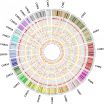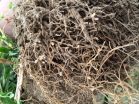Nanoparticles at specific temperature stimulate antitumor response
Dartmouth researchers identify precise heat to boost immune system against cancer tumors
2015-04-14
(Press-News.org) Seeking a way to stimulate antitumor responses via the immune system, Steven Fiering, PhD, of Norris Cotton Cancer Center at Dartmouth, has identified the precise temperature that results in a distinct body-wide antitumor immune response that resists metastatic disease. Fiering's team published the research in the paper "Local Hyperthermia Treatment of Tumors Induces CD8+ T Cell-Mediated Resistance Against Distal and Secondary Tumors," which appeared in Nanomedicine: Nanotechnology, Biology and Medicine.
"Mild hyperthermia treatment of an identified tumor, prior to surgery to remove the tumor, shows excellent promise to strengthen the antitumor response and help stop metastatic disease," explained Fiering.
Among the many options for cancer treatment pursued by science, immunotherapy is a contemporary focus. The immune system recognizes and usually eliminates small tumors, but other tumors become clinical problems and are known to block the antitumor tendencies with a natural system for immunosuppression. Recently, scientists have worked to learn how to reverse this tumor-mediated immunosuppression. In addition, phagocytes (key actors in immunosuppression and immunostimulation and that quickly take up nanoparticles) have provided options for new strategies. Fierings's studies were done in mice with a melanoma tumor model, and began with inserting iron nanoparticles directly into the tumors while applying an alternating magnetic field to heat the nanoparticles evenly and at precise temperatures.
"While it's easy to apply enough heat to destroy the tumor, that sort of thermal ablation does not have the result we were looking for, which was to stimulate a systemic immune response to eliminate metastatic disease," said Fiering. "Looking at temperature variables, we learned that at precisely 43 degrees centigrade, the systemic immune response goes into action. Doing this safely is a potent treatment approach that can stimulate the immune system to fight untreated metastatic tumors."
Fiering utilized Dartmouth's Shared Resources including the Transgenic Mouse Resource to do mouse manipulations. Colleague P. Jack Hoopes of Dartmouth's Thayer School of Engineering provided the vitally important alternating magnetic field equipment. The Dartmouth Shared Resources are open to outside investigators by arrangement.
Using Norris Cotton Cancer Center's team science approach, Fiering and Hoopes look forward to joint studies testing the systemic immune response to nanoparticle treatment in dogs with melanoma. As in humans, melanoma is frequently metastatic and fatal for dogs. If the systemic immune response can be shown to prevent metastatic disease in dogs, it will be ready to develop for human clinical trials.
INFORMATION:
Fiering is Professor of Microbiology & Immunology, and of Genetics, at Dartmouth's Geisel School of Medicine. His work in cancer is facilitated by Dartmouth's Norris Cotton Cancer Center where he is a member of the Molecular Therapeutic Research Program.
Support for "Local Hyperthermia Treatment of Tumors Induces CD8+ T Cell-Mediated Resistance Against Distal and Secondary Tumors" was provided by the Dartmouth Center for Nanotechnology Excellence, National Institutes of Health grant 1 U54 CA151662, Center for Molecular, Cellular, and Translational Immunological Research grant NIGMS P20 RR15639, Norris Cotton Cancer Center Support Grant P30 CA023108 and Dartmouth Immunobiology of Myeloid and Lymphoid Cells grant 5T32A1007363-22.
About Dartmouth-Hitchcock Norris Cotton Cancer Center
Norris Cotton Cancer Center combines advanced cancer research at Dartmouth and the Geisel School of Medicine with patient-centered cancer care provided at Dartmouth-Hitchcock Medical Center in Lebanon, NH, at Dartmouth-Hitchcock regional locations in Manchester, Nashua, and Keene, NH, and St. Johnsbury, VT, and at 12 partner hospitals throughout New Hampshire and Vermont. It is one of 41 centers nationwide to earn the National Cancer Institute's "Comprehensive Cancer Center" designation. Learn more about Norris Cotton Cancer Center research, programs, and clinical trials online at cancer.dartmouth.edu.
ELSE PRESS RELEASES FROM THIS DATE:
2015-04-14
NEW YORK, NY (April 14, 2015) -- The first-ever systematic study of the genomes of patients with ALK-negative anaplastic large cell lymphoma (ALCL), a particularly aggressive form of non-Hodgkin's lymphoma, shows that many cases of the disease are driven by alterations in the JAK/STAT3 cell signaling pathway. The study also demonstrates, in mice implanted with human-derived ALCL tumors, that the disease can be inhibited by compounds that target this pathway, raising hopes that more effective treatments might soon be developed. The study, led by researchers at Columbia University ...
2015-04-14
Macrophages destroy bacteria by engulfing them in intracellular compartments, which they then acidify to kill or neutralize the bacteria. However, some pathogenic bacteria, such as Salmonella enterica, have evolved to exist and even grow while within these acidified compartments. Yet, how Salmonella responds to the acidic environment and how that environment affects the virulence of this pathogen are unclear. New research reveals that Salmonella fights acid with acid, by lowering the pH of its own interior in response to the acidification of the Salmonella-containing compartment ...
2015-04-14
An unconventional clinical trial design might have advantages over classical trials for testing treatments for Ebola virus disease (EVD), suggests a study published this week in PLOS Medicine. The work of an international team led by John Whitehead of Lancaster University, UK and Ben Cooper of Oxford University, UK, provides much-needed data to inform a debate on the scientific and ethical justification for non-randomized EVD trials that has taken place in the editorial pages of a number of medical journals in past months.
The researchers compared three different scenarios ...
2015-04-14
In recent years, research into the benefits of gut bacteria has exploded. Scientists across the globe are examining how these microbes can help improve health and prevent disease.
One of the most well-known of these is Lactobacillus rhamnosus GG (LGG). This strain of bacteria, which is part of many popular probiotic products, has a reputation as a helpful microbe. Researchers have found evidence that it can help with intestinal problems, respiratory infections and some skin disorders. Some research suggests that it may even help with weight loss.
But a key question ...
2015-04-14
In research of significance to the world's expanding coastal populations, scientists have found that geology and infrastructure play key roles in determining whether aquifers that provide drinking water are inundated with seawater during a typhoon or hurricane and how long the contamination lasts.
In 2013, Typhoon Haiyan devastated the Philippines, killing more than 6,000 people and destroying nearly $3 billion worth of property. While the country is still recovering from the storm, researchers with The University of Texas at Austin have found that an aquifer on the island ...
2015-04-14
PULLMAN, Wash. - A team of international scientists has shown that assigning a dollar value to the benefits nature provides agriculture improves the bottom line for farmers while protecting the environment. The study confirms that organic farming systems do a better job of capitalizing on nature's services.
Scientists from Australia, Denmark, New Zealand, the United Kingdom and the United States describe the research they conducted on organic and conventional farms to arrive at dollar values for natural processes that aid farming and that can substitute for costly fossil ...
2015-04-14
As HIV investigators work to control and eradicate the virus worldwide, certain myths or misconceptions about the disease have been embraced, whereas other concepts with merit have been left relatively unexplored, argues American HIV/AIDS researcher Jay Levy, MD, in a commentary publishing April 14 in the journal Trends in Molecular Medicine. He calls on fellow researchers to continue questioning and not to lose sight of alternative strategies that could ultimately lead to a sustainable, long-term solution to HIV infection.
"This paper may be controversial, but people ...
2015-04-14
You might think that you can get away with eating fatty foods for a few days without it making any significant changes to your body.
Think again.
After just five days of eating a high-fat diet, the way in which the body's muscle processes nutrients changes, which could lead to long-term problems such as weight gain, obesity, and other health issues, a new study has found.
"Most people think they can indulge in high-fat foods for a few days and get away with it," said Matt Hulver, an associate professor of human nutrition, foods, and exercise in the Virginia Tech College ...
2015-04-14
This news release is available in German. Looking after yourself, and trying not to infect others, is a good strategy to prevent disease from spreading - not only if you are a considerate co-worker, but also if you are an ant, meerkat or other social animal, as revealed by an epidemiological model developed by the groups of Professor Fabian Theis from the Helmholtz Center Munich and Professor Sylvia Cremer from the Institute of Science and Technology (IST) Austria. In a Theme Issue of the Philosophical Transactions of the Royal Society B on "The Society-Health-Fitness ...
2015-04-14
This news release is available in Spanish and Spanish.
Combination of the anticancer drug PM1183 with PARP inhibitors and doxorubicin results in a synergistic effect against breast cancer cell lines and a SCLC mouse tumor model, respectively.
The anticancer candidate plitidepsin binds to eEF1A2, a novel therapeutic target in multiple myeloma, and shows activity in patient-derived tumor mouse models from a wide range of solid tumors and hematological cancers.
The new antibody-drug conjugate (ADC), MI130004, shows in vivo potent and long-lasting anticancer effects ...
LAST 30 PRESS RELEASES:
[Press-News.org] Nanoparticles at specific temperature stimulate antitumor response
Dartmouth researchers identify precise heat to boost immune system against cancer tumors


